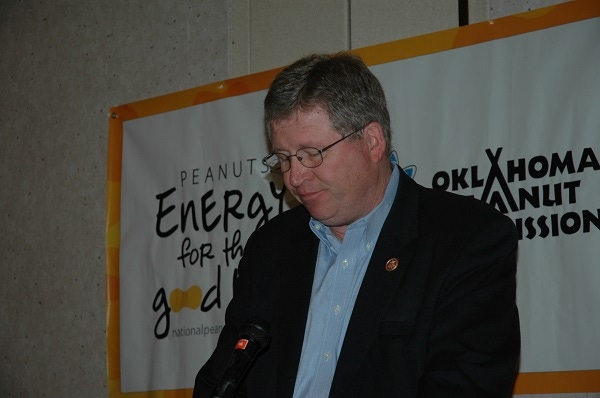
Regrets, Frank’s had a few, but then again, too few to mention.
The biggest regret, says Representative Frank Lucas (R-Okla.), Chairman of the House Agriculture Committee, is that Congress did not make the Agriculture Act of 2014 permanent law. That failure, he said, may give some legitimacy to beliefs that the recently signed law could be the last farm bill. And it also leaves open the possibility of reverting, at some time, back to permanent law passed in 1938 and 1949, a time in agriculture that is far removed from modern farms and ranches.
Lucas, keynote speaker at the recent Oklahoma Peanut Expo in Lone Wolf, Okla., said the Agriculture Act of 2014 continues to provide a farm safety net and cuts spending, not as much as some would have preferred but also more than others liked.
“We had to craft a bi-partisan bill,” Lucas said. “The farm bill has always been a coalition of the middle.” That middle ground was harder than usual to locate on a map of a Washington political landscape that had defied compromise for more than five years. The hard left and the hard right threatened to crush the moderate middle.
For more information about the Agriculture Act of 2014 and other issues,please check out Southwest Farm Press Daily and receive the latest news right to your inbox.
“The left doesn’t want to spend money on rural America,” Lucas said. “But the right wants to spend no money on anything on any occasion. But they still have a responsibility to provide for American agriculture.”
Lucas said passing the law was “almost a miracle.” The process included a “very conservative House, a liberal president, a Senate with no control and a $17 trillion debt.”
Surviving Farm Bill Changes Part IV
Add to that a significant turnover in the House, including changes in the agriculture committee, and the climb became even steeper. “We had about half the House that didn’t understand what we were doing,” Lucas said.
The process had begun back in 2010 with hearings set up by then Ag Committee Chairman Colin Peterson. Lucas has been at the helm for two-and-a-half years and faced an entrenched, divided House unwilling to compromise. “We (the Ag Committee) put together a good bill and could not get it on the floor,” he said.
He recalled a later attempt when, knowing the votes were not adequate to pass the bill, he made an impassioned speech to “explain why the farm bill was important. I spoke for five minutes and got a standing ovation,” he said. “Then they voted the bill down.”
He said deep cuts in the nutrition title turned Democrats away. “And some Republicans would not vote for it. A lot of members did not want a farm bill and stir up people,” he added.
That’s when they split nutrition from the commodity title and decided to let a conference committee “ultimately pull the bills together.
“We had a challenge in the House but we also had challenges outside,” Lucas said. “We saw more than usual philosophical differences among farm groups. Typically, the groups come together.”
Differences showed up between commodities and between different regions of the country. Some wanted a shallow loss program, some wanted price revenue. The final bill offers choices.
“What a struggle,” Lucas said. “What a challenge.”
He said one noteworthy section of the new law could serve as a model for future negotiations. “A livestock disaster section is permanent law.”
The possibility that the Agriculture Act of 2014 could be the last farm bill has been discussed, Lucas said. He acknowledged that without cooperation from members of congress as well as agricultural interests, enacting another law will be difficult. But he urged attendees to help elect people who understand agriculture and care about rural America.
“Farmers have to make big decisions this fall,” he said. “You need to look for folks who have backgrounds in agriculture, then look for folks who have some understanding of agriculture and then look for those who are at least willing to learn about what goes on in the countryside.
“Give us some help, people who want to work with us. If you can do that, we will continue to have farm bills.”
He said agriculture is too important not to continue supporting it through Congress, and he noted that agriculture is not the only industry with a safety net. “People across the country and around the world benefit from American farm programs,” he said.
Lucas intends to stay active in ag legislation. “I will not be Chairman after this Congress, but I will always be on the House Ag Committee,” he said.
Also of interest:
About the Author(s)
You May Also Like






